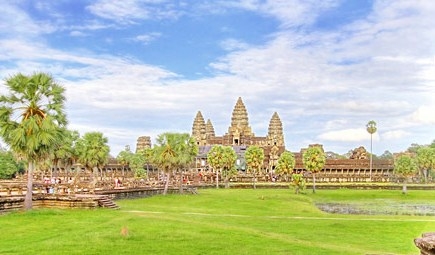UNWTO/UNESCO World Conference on Tourism and Culture

Siem Reap , Cambodia :More than 900 participants, including over 45 Ministers and Vice Ministers of Tourism and Culture, international experts, speakers and guests from 100 countries, gathered at the UNWTO/UNESCO World Conference on Tourism and Culture in Siem Reap, Cambodia, to explore and advance new partnership models between tourism and culture (4-6 February 2015).
Tourism, moving more than one billion people across international borders each year, offers immense possibilities for socio-economic development in destinations around the world. Cultural tourism has proven to increase competitiveness, create employment opportunities, curb rural migration, generate income for investment in preservation, and nurture a sense of pride and self-esteem among host communities. Yet, in order to effectively promote and safeguard the very heritage cultural tourism relies on, a sustainable, multi-stakeholder approach is crucial.
Over the course of two days, the First UNWTO/UNESCO World Conference on Tourism and Culture brought together Ministers, leading experts and stakeholders in the two fields to highlight the need to create a new framework for collaboration between tourism and culture, which includes active participation of host communities, visitors, the public and the private sector.
“We need cross cutting policies to promote the sustainable development of cultural tourism”, said Samdech Akka Moha Sena Padei Techo Hun Sen, Prime Minister of the Kingdom of Cambodia, opening the meeting. “This Conference represents an important contribution to advance the future Sustainable Development Goals (SDGs) through the link between tourism and culture”, he added.
“Cultural heritage tells mankind’s story; it tells our story. Carefully managed, tourism can protect and enliven this heritage, generate new opportunities for local communities, and foster tolerance and respect between peoples and nations”, said UNWTO Secretary-General Taleb Rifai opening the Conference. “It is up to us to work together to harness the sheer force of one billion tourists, turning it into one billion opportunities to contribute to inclusive economic growth, social development and advancement of the post-2015 sustainability agenda around the world. I trust this Conference will allow us to strengthen our partnerships and work closer together as architects of such a sustainable future”, he added.
“Every tourist must be a custodian of world heritage, an ambassador of intercultural dialogue. This is why safeguarding cultural heritage must move forward with sustainable tourism”, said Irina Bokova, UNESCO Director-General, in her message to the conference. “This vision guides our efforts to promote culture as a driver and as an enabler of sustainable development.This has never been so important at this time of change, when countries are shaping a new global sustainable development agenda to follow 2015”.
In his key note address to the Conference, King Simeon II, former Prime Minster of Bulgaria, said: “As one of the three living heads of state from World War II, I must share with you what first came to my mind when reading about culture coupled with tourism: peace, harmony, mutual understanding. Promoting peace and understanding among people, securing thus a better standard of living, bonds of friendship in a world with far too much aggressiveness, hatred, inequality and prejudice, is vital. We need to ensure that cultural tourism is on the international community’s agenda for sustainable development in view of the new Sustainable Development Goals.”
In his key note address, HRH Prince Sultan bin Salman bin Abdulaziz Al-Saud, Chairman of the Saudi Commission for Tourism and Antiquities stressed the efforts of the Saudi Commission in “promoting cultural heritage on various levels including its linkage to tourism, to the national economy and the development of the nation.”
In message to the Conference, the United Nations High Representative for the Alliance of Civilizations (UNAOC), Nassir Abdulaziz Al-Nasser, stressed that “the power of culture diversity has been acknowledged as an integral component for the achievement of the Millennium Development Goals and will remain an essential element of the post 2015 Sustainable UN Development Agenda. In this context, tourism plays an essential role in helping people of different cultures understand each other and eliminate cultural barriers”.
The Ministerial Dialogue, moderated by Andrew Stevens from CNN International, focused on how tourism and culture administrations can work together to develop a governance framework for sustainable cultural tourism, which contributes to the socio-economic development of host communities, promotes cross-cultural exchanges, and generates resources for heritage conservation. Ministers stressed the importance of creating common institutional structures to plan and manage cultural tourism, ensure community engagement and empowerment and cooperation with the private sector.
The technical sessions focused on cultural preservation, cultural routes, tourism and creative industries, and urban regeneration through cultural tourism.
On the occasion of the Conference, the Agreement on the Establishment of the International ST-EP (Sustainable Tourism Eliminating Poverty) Organization was signed by Cambodia, Ethiopia, Peru, Paraguay and the Republic of Korea in the presence of the UNWTO Secretary-General and the Chairperson of the Board of Directors of the ST-EP Foundation, Amb. Dho Young-shim.- UNWTO
Feb 7, 2015














